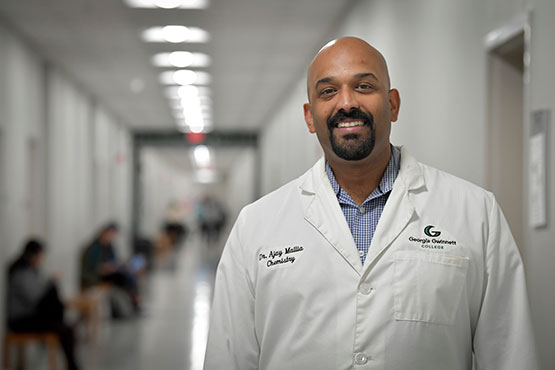news
Award-winning chemistry professor engages students with the soft side of science

Have you ever stopped to think how fascinating toothpaste is? Its solid-like and changes to fluid-like as it’s squeezed out of a tube, then becomes solid-like again once it’s resting on the toothbrush. That consistency is no accident, said Dr. Ajay Mallia, associate professor of chemistry at Georgia Gwinnett College. It is by design, and the science behind those miraculous properties is what he has dedicated his life to studying and teaching.
“I create what I call organic, functional, soft materials (OFSMs),” said Mallia, who this year was named a Fellow of the American Chemical Society. “When a material is soft, you can easily tune its properties. For instance; if toothpaste was hard you couldn’t get it outside the tube, but when you apply that mechanical force, the material liquifies. Once it is on your brush, it goes back to the original state. We call that a ‘self-healing’ material.”
Not coincidentally, Mallia said, most parts of our bodies are examples of soft materials and self-healing, too. One function of the OFSMs he researches could be delivering medication.
“A lot of pharmaceutical drugs are examples of soft materials,” he said. “I take pharmaceutically active molecules and without removing the core molecule that gives the pharmaceutical property, I try to make a soft material using organic synthesis. If I do it right, the molecules self-assemble in liquids and form gel-like materials that are useful as an alternate mode of drug-delivery vehicles. Compared to the polymer-based capsules, soft-materials can be less toxic, and also protect the molecule from degradation, as well as help in controlled drug release."

Dr. Ajay Mallia with student
(File photo: 2019)
The seed for Mallia’s passion for chemistry was planted early, when he was a young boy in India. He remembers always being fascinated by demonstrations of chemical reactions, like mixing baking soda with vinegar, and the excitement of being in a lab.
“When we are in a lab, we mix different chemicals to create something new,” he said. “I’m particularly fascinated by organic molecules, and how you can make something harder and softer. Like when you bake bread – if you heat it slightly, it becomes harder. That’s chemistry.”
Mallia carries his enthusiasm for chemistry into the classroom, where he uses an active learning style to engage his students.
“I tell my students learning has three processes: understanding, mastering and retaining,” he said. “Most of us learn by asking questions, but it’s difficult for many people to ask questions in a classroom setting, because of the risk of failure. I try to teach my students how to ask the right questions.”
In addition to naming Mallia a fellow this year, the ACS also named him its inaugural national winner of the Outreach Volunteer of the Year award for, among other things, successfully organizing weeklong outreach activities at museums, high schools, and academic institutions that had over 1,000 attendees in 2019.
He sees his outreach efforts as one of the most important things he does. He performs hands-on chemistry demonstrations for local high school students to spark their interest in science, technology, engineering and mathematics (STEM) and motivate them to seek higher education. Last year, his demonstration was the making of paper, which proved to be uniquely fascinating to high school students. Additionally, every summer he recruits five or six economically disadvantaged students to help with his research in the college setting. They earn a stipend to keep them from seeking traditional summer jobs.
“I love getting kids interested in science, STEM and research,” said Mallia. “My favorite thing in the world is when I hear a student say, ‘I want to know more.’”
